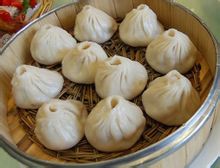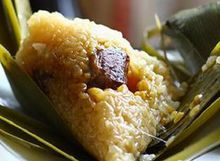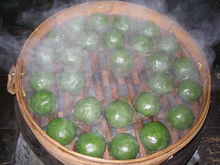I was born and raised in the South-Eastern part of China, in a city called Wuxi. People in my home city like adding a little bit sweetness to whatever food they are cooking to make the dish taste better. They refers this way of cooking as 提鲜. Also, unlike people in the Northern or Western part of China, rice instead of noodles is the staple food and there are a lot of dishes made of rice in my home city. Bearing my cultural background and the unique cooking style in my home city, I will first introduce some foods which that are important to me and represent my family as well as my cultural backgrounds. Mini soupy bun – 小笼包, rice dumpling with meat and egg yolk – 蛋黄肉粽, and green dumpling – 青团are very unique foods in my home city and can best represent my cultural background.

Mini soupy bun is a very famous dish in Jiangnan area, and has a deep historical background. The appearance of mini soupy bun in Wuxi can be traced to Qing Dynasty. Qianlong Emperor, one of the emperors in Qing Dynasty, came to Wuxi during his cruise in Jiangnan area. He went to a garden called Qinyuan – 秦园, and tried mini soupy bun there. He was amazed at the taste immediately mini soupy bun from Wuxi became famous all around the country. Although there are different styles of mini soupy bun in different cities such as Shanghai, Changzhou and Nanxiang in Jiangnan area, mini soupy bun in Wuxi is unique to me since it incorporates the cooking style in my home city. It is sweeter than those in other cities and is a perfect combination of sweetness and delicacy.  Rice dumpling is the traditional food for Dragon Boat Festival. According to the historical documents, Quyuan, both a politician and a poet from Chu – a country in Zhanguo period, was exiled by the emperor. He was very upset and drown himself in Miluo River. He was highly respected by citizens in Chu, and they threw rice dumplings into the river to prevent fishes from consuming his body. Also, they used boats to find his body. Thus, people commemorate Quyuan on Dragon Boat Festival and rice dumpling becomes a symbolic food for the festival. Green dumpling is the traditional food for Thom-sweeping Day when people commemorate the dead in Jiangnan area. According to the legend, Li Xiucheng, the leader of Taiping Kingdom of Heaven (from 1851-1864), was chased by the army directed by the emperor from Qing Dynasty on the Thom-sweeping Day. He was camouflaged as a farmer and the army did not find him. However, the army checked everyone to prevent farmers from bringing food to Li. A farmer mixed the juice of Chinese mugwort – 艾草, to make the dumpling look like grass, and brought green dumpling to Li. Li survived after he was fed on the green dumpling. Later, he made eating green dumpling on Thom-breading day a rule.
Rice dumpling is the traditional food for Dragon Boat Festival. According to the historical documents, Quyuan, both a politician and a poet from Chu – a country in Zhanguo period, was exiled by the emperor. He was very upset and drown himself in Miluo River. He was highly respected by citizens in Chu, and they threw rice dumplings into the river to prevent fishes from consuming his body. Also, they used boats to find his body. Thus, people commemorate Quyuan on Dragon Boat Festival and rice dumpling becomes a symbolic food for the festival. Green dumpling is the traditional food for Thom-sweeping Day when people commemorate the dead in Jiangnan area. According to the legend, Li Xiucheng, the leader of Taiping Kingdom of Heaven (from 1851-1864), was chased by the army directed by the emperor from Qing Dynasty on the Thom-sweeping Day. He was camouflaged as a farmer and the army did not find him. However, the army checked everyone to prevent farmers from bringing food to Li. A farmer mixed the juice of Chinese mugwort – 艾草, to make the dumpling look like grass, and brought green dumpling to Li. Li survived after he was fed on the green dumpling. Later, he made eating green dumpling on Thom-breading day a rule.  This legend is not verifiable in any historical documents but eating green dumpling on Thom-sweeping Day has become the tradition in my home city. It is made of rice and the stuffing is always the red bean paste. It may be too sweet for people from the Northern part of China, but it represents the cooking style in Jiangnan. In a conclusion, mini soupy bun from Wuxi, rice dumpling and green dumpling can represent my cultural background due to their deep historical backgrounds and unique cooking style.
This legend is not verifiable in any historical documents but eating green dumpling on Thom-sweeping Day has become the tradition in my home city. It is made of rice and the stuffing is always the red bean paste. It may be too sweet for people from the Northern part of China, but it represents the cooking style in Jiangnan. In a conclusion, mini soupy bun from Wuxi, rice dumpling and green dumpling can represent my cultural background due to their deep historical backgrounds and unique cooking style.
There is a rich variety of ethnic groups in Atlanta and the Black is the major ethic group. Unfortunately, I never tried food from the black community. When I stay in Atlanta, Asian food especially Chinese food and Korean food is always my top choice. Besides, I tried several Italian restaurants. I used to take a Math class and the professor is an Italian. She recommended some authentic Italian restaurants to me and my favorite one is called Ribalta in downtown Atlanta. I love the pasta in this restaurant, but I do not think pizza there is authentic. When I was in Italy, I found there was no protein but only veggies and cheese in pizza. However, every kind of pizza in Ribalta has protein.

Thanks for such detailed descriptions of the dishes! One suggestion I have in regard to the essay prompt is to discuss their significance, especially to you or to your family.